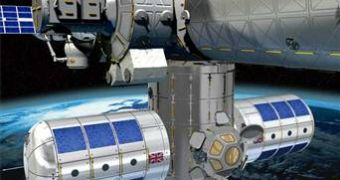The already busy schedule of building the International Space Station is about to get busier soon, due to British scientists and engineers proposal to launch two separate habitable modules by the year 2011. However, the ISS partnership between NASA, ESA and a few other countries has not approved the project so far, not to mention that the UK government has been delaying the collaboration with other space agencies for more than a decade.
The proposal came as a direct result of the scheduled launch of the ISS Node in 2010, which would supply with additional connection ports to the ISS. The Habitable Extension Modules could provide with additional space for storing equipment for a crew complement of six. Currently, the ISS has a permanent crew of three and will shift to six persons by 2009.
Because the U.S. government plans to replace the space shuttle with another space vehicle, the two modules would probably be flown into space with the help of the Russian Soyuz rockets, released into the Earth's orbit, after which the modules would steer themselves into position with their own propulsion system.
On top of the advantage posed by the delivery of two additional modules, an eventual launch would also offer the chance to deliver fresh supplies and new experiments to keep the space station running and, for the first time, a radiation shelter. Nevertheless, the U.K. government doesn't really seem to be too interested in investing one billion U.S. dollars into the project.
Amazingly, the U.K., one of the most powerful countries in the world, is still not involved in the ISS building project, but its flag is posted to the side of the Destiny module only because it signed the Space Station Agreement. The U.K. has routinely rejected the proposal to participate in the building of the European Columbus module and is not part of the European Space Agency.
John Yembrick, NASA's spokesperson, stated that the U.S. Agency will consider the proposition, after it has made a detailed report of the power, crew and propulsion of the ISS.

 14 DAY TRIAL //
14 DAY TRIAL //